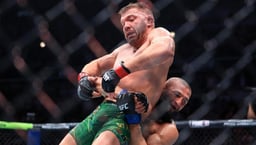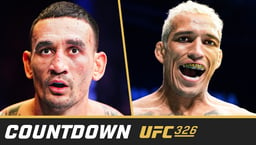
Issue 129
June 2015
Fighters in the UFC had better be aware, or even beware, of the appointment of Jeff Novitzky as its internal anti-drug czar. He knows all the tricks. He’s smart, tenacious and has no fears about being controversial: as he’s been in the past.
It’s worth recalling this is the federal agent who went through Victor Conte’s trash at the infamous BALCO laboratories and claimed it was public property. Not bad for a graduate of accountancy.
Novitzky will spearhead development of the UFC’s clean initiative education program, designed to ensure every athlete competes with natural ability on an even playing field.
The federal agent for the United States Food and Drug Administration (USFDA) since 2008, Novitzky led investigations into companies suspected of illegal distribution of dietary supplements and designer steroids.
Prior to joining the USFDA, Novitzky was a special agent for the Internal Revenue Service in their Criminal Investigation Department, where he oversaw and investigated some of the highest-profile performance-enhancing drug (PED) cases in professional sports. That included baseball’s infamous Barry Bonds case.
Novitsky wants to be at the heart of creating “a new gold-standard testing program” and in July, it will launch. In the past, he’s been described as an “obsessed investigator,” and frankly, if MMA is to be rid of drugs cheats, it will need that zeal.
What’s interesting about Novitzky is he was given carte blanche by the head of the IRS to drop an agent’s normal duties – investigating tax fraud and money laundering – and became a de facto national sports doping czar.
Bottom line is, Novitzky will have to ‘intrude’ on the lives of MMA fighters. Frankly, the sport needs it. Good luck to him.
PED SOLIDARITY
It’s not just the UFC with a clear desire to rid the sport of PEDs. Over at Bellator MMA – whose stock rose and stability was established when it was bought by
$23 billion mass-media giant Viacom – there’s a desire for the same outcome.
Scott Coker, CEO for the last 10 months, has just marked his 30th year in fight sports and is at pains to point out to me that the whispers about what goes on behind closed doors needs to change.
“There’s so many athletes out there that are clean, aren’t taking drugs, walking the line straight, fighting and performing,” he says. “I just hope the journalists and the fans don’t say, right, this is MMA. It’s not.
“There are thousands of athletes that fight in MMA. We’ve had some high-profile cases, but I’d hate to see that be thrown on everybody. Hopefully, the athlete will realize you can’t be on PEDs and you can’t be doing drugs and competing. It’s illegal.
“If you want to be a professional fighter, you should act like a professional fighter.” Coker insists all major MMA organizations work together, in an agreement. “It couldn’t just be one. It has to be everybody together.”
That, of course, will have to include the athletic commissions in the USA and national governing bodies in other countries. July is going to be a fascinating month as this thing kicks off. My instinct is it’s going to get a whole lot worse before it gets better, but ironing out the wrinkles is long overdue.
WE NEED TO TALK ABOUT KEVIN
While everyone was praising UFC, Stephan Bonnar and Forrest Griffin for the 10-year anniversary of The Ultimate Fighter season 1 and what it created, one man missed out on a little praise – Kevin Kay. He was head of Spike TV and gave the show the green light. It was a huge risk, but he took it.
The UFC was $40 million in a hole, yet Kay gave it a shot on TV. Remember, it was the only network showing it. Not like today, where every network has an MMA show of some sort.
“Dana and Frank and Lorenzo had come in a few times to pitch us fights. I didn’t get it. Senator (John) McCain called it ‘human cockfighting’ and it was banned. I said I couldn’t just put guys in a bloody cage on Spike TV,” Kay tells me.
He recalls Dana White pounding on the table and telling him he was “out of his mind.” But slowly Kay took note of the young execs in his office as White and the Fertittas, to their credit, kept coming back.
“As a TV executive, you have to take that seriously. When young people are telling you that this is something bubbling up under the surface, you’ve got to listen.” He went to the fights; he liked them, but still didn’t think it belonged on Spike.
“I kept saying to them they had to come with a different approach. They came in with The Ultimate Fighter. They had thought it through and it was right.” The world’s first reality fight series. The rest is history.










